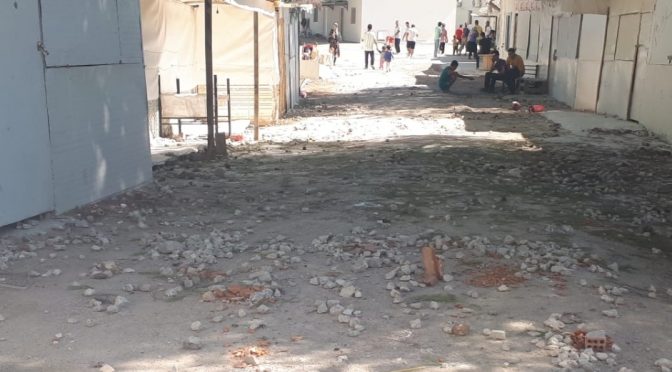“In a world of war”, where can we find safety?
We escaped from far away lands, lands of war, violence and misery. We came here so that our children would not have to see the violence we had witnessed.
We passed the borders of life and death in search of safety and shelter. We put our lives in the mercy of smugglers and strangers to help us cross rocky mountains, deep valleys, deserts and, at the end, the angry sea. Europe was the light which kept us going. Europe was the promise of a new life at the end of the journey.
Yet, what we are experiencing, here and now, is the threat of a dark and unknown future for us, our children and the next generations.
Where can we find safety? This is, for us, the most vulnerable moment in our lives, a moment for which we had not been prepared. We have never, before, lived together with different communities, each with a different culture, different religion and beliefs, different customs, different histories. What we share is that we all crossed borders which left us with injuries, injuries in our bodies and, even more difficult to treat, injuries in our souls. Our life as refugees is filled with anxiety and mental stress. The process of reviewing our
application for asylum; our worries about our beloved ones left behind and living in danger; the future of our children which is wasted as they have no opportunity to go to school; our transfers from one camp to another, from detentions to ghettos , all create fears, worries, anger and frustration. No wonder that chaos and violence break in the camps.
No one who arrives here enjoys mental health, even the physically sound ones are suffering of depression and other psychological difficulties. And even if those arriving are free of such symptoms, once here and as the months of waiting go by, they soon feel vulnerable and exposed, anxious and afraid.
In such an atmosphere, a small event can provoke negative feelings, even violence among different groups. It is enough to have a child throw a stone to another from another community and, soon enough, there is suspicion and hatred between the two groups. Similar feelings are generated if, for example, a child falls from its bicycle as another, belonging to another community, is passing by.
Such events may seem minor and insignificant. Yet such events have had terrible consequences. People arm themselves with sticks, knives, bats because they feel they may be attacked and need to feel that they can defend themselves and their families. Even our fathers and brothers pile us things ,that they can use to defend us. Women collect stones for their men so that they can protect them.
How could it be otherwise, when 2500 people are piled together, even now that we are facing a new ferocious threat, the Corona Virus. The form that ‘our safety quarantine’ takes is imprisonment We are forced to live in closed ‘facilities’ even as the number of infected people among us is rising.
When violence breaks and we call the police, no one answers, no one
interferes.
I am afraid I can be caught in this violence, this war. I am afraid that I may injure someone, that I may lose my belief in people and in the possibility of peace in our lives. And I am afraid of what can happen to my father and brothers and I am tired of seeing my mother cry or hear people scream.
Where can we find safety? Surely not when we are locked up, repressed, hidden in a far away and isolated camp. Nobody sees us, nobody cares, nobody understands that the life of our children having no schooling is wasted in idleness. Yet we have dreams of becoming doctors, engineers, teachers. . .
But how long…..?
How long should we witness violence?
How long should we arm ourselves for protection?
How long should we suffer anxiety and depression?
How long should our children carry stones instead of books and pencils?
How long should we waste away, facing total indifference about our future?
How long should we be targeted as deserving repression?

